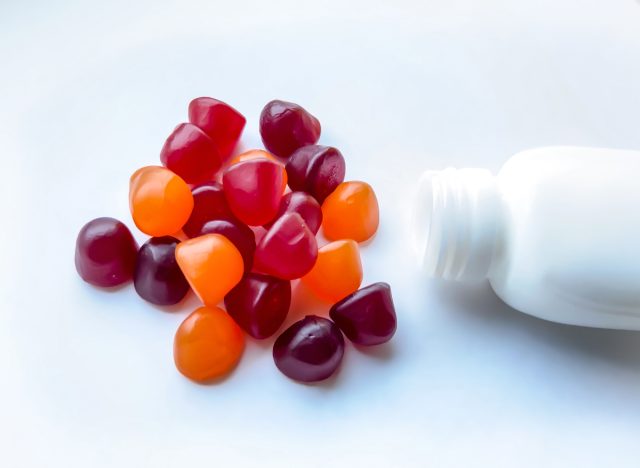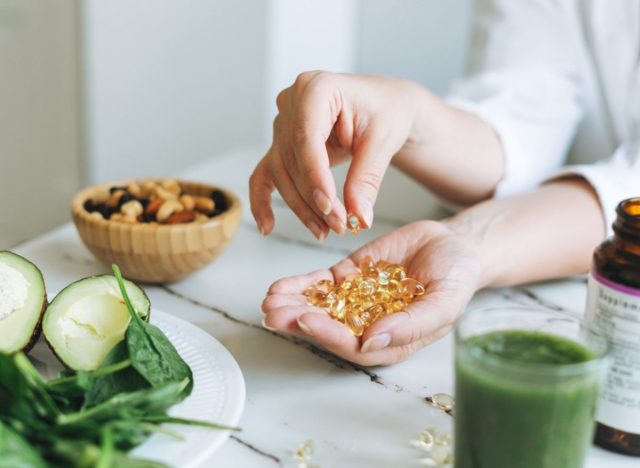7 Side Effects of Taking a Multivitamin Every Day

Vitamins and supplements can be a great way to give your body the nutrients it needs when you're unable to get enough through your diet. In a perfect world, the food and drinks you consume would provide the daily recommended amounts of necessary nutrients, but this isn't always the case when you're low on time, money, or energy. Sometimes you need a quick and easy way to give your health a boost, and taking a multivitamin is a common way people aim to solve this problem. But what are the potential side effects of taking a multivitamin every day?
Before we begin to answer that question, let's define what a multivitamin actually is. According to the National Institutes of Health (NIH), it's a supplement that contains a combination of vitamins and minerals, oftentimes in quantities close to your recommended daily amount. The NIH emphasizes that although these can be helpful, it's important to not let a multivitamin take the place of eating a healthy, balanced diet.
To learn more about what happens when you take a multivitamin every day, we talked with expert doctors and dietitians about the positive and negative side effects that may occur. But, before you incorporate one into your own daily routine, it's best to talk with your health care provider. Read on, and for more, don't miss The Best Supplements To Slow Aging, Say Dietitians.
You may have healthier hair, skin, and nails.

If you're looking for stronger, healthier hair, or are wanting clearer, more youthful looking skin, it's possible that the right multivitamin can help you in your goals.
"Some multivitamins contain specific nutrients like biotin, vitamin E, and zinc, which are known to promote healthy hair, skin, and nails," says Mary Sabat MS, RDN, LD. "Biotin, for example, is essential for maintaining the health of these tissues and is often included in multivitamins targeted toward improving their condition. Vitamin E acts as an antioxidant, protecting skin cells from damage, while zinc supports the production of proteins necessary for hair and nail growth."
They can help reduce the risk of anemia.

Anemia is a fairly common issue that is caused by your blood not producing enough healthy red blood cells, with iron-deficiency anemia specifically developing from not having adequate iron levels in your body.
According to Sabat, choosing the right multivitamin may help you prevent iron-deficiency anemia by helping you reach your recommended iron levels. "Iron is a crucial mineral for red blood cell production and oxygen transport in the body," she says, "This is why multivitamins with iron can be beneficial for individuals at risk of or experiencing iron deficiency and can help prevent symptoms of anemia like fatigue, weakness, and shortness of breath."
If your iron levels are low, talk with your doctor about the best type of multivitamin you can take.
Multivitamins may sometimes interfere with medical tests

This is a rarer occurrence, but Sabat says that "some multivitamins can interfere with certain medical tests, leading to inaccurate results."For example, high-dose vitamin C supplements can interfere with certain blood glucose tests, potentially giving false results." She adds, "Similarly, some multivitamins containing biotin can interfere with hormone tests, such as thyroid function tests."
To avoid any possible interferences when having a medical test done, talk to your healthcare provider about the vitamins and supplements you're currently taking.
You fill in nutrient gaps in your diet.

First thing first: you should always try to eat a balanced, veggie-filled diet that provides the minerals and nutrients your system requires. In a dream world, we would all be able to get everything we need from our meals, but in reality, many of us have gaps that need to be filled. As author and nutritional expert Dr. Josh Axe, DNM, DCNS, DC explains, 70% of the average American diet comes from processed or ultra-processed foods, which are calorie-dense but light on vitamins and minerals. A daily supplement can't erase the damage of the foods you eat, but it can point you in a better direction.
Dr. Axe says a study published a few years back in the Journal of Nutrition indicates that dietary habits of a large population of our nation consistently fail to meet even the minimal intakes recommended in the Dietary Reference Intake (DRI) for many vital nutrients.
"The study concluded that, without dietary supplementation and other ways of supporting proper nutrient intake, many Americans don't achieve even the minimum recommended micronutrient intake levels they need," he says.
A multivitamin can help you feel energized.

If you're feeling exhausted day-in and day-out, a multivitamin may be the motivation you've been craving to get going. Education Scientist at Life Extension, Dr. Vanessa Pavey, ND, explains that taking a multivitamin provides essential water-soluble B vitamins that we need to release the energy that's trapped inside carbohydrates, fats, and proteins.
"This released energy can now fuel our cells and provide the power we need to carry out our daily activities," she says. "B vitamins also encourage healthy organ function and cognitive health."
You give your heart a boost.

Your heart keeps beating with each and every passing year, and yet, many people don't have excellent cardiovascular health. Dr. Axe says this organ should be top of mind and high priority since it affects so much of your overall well-being. "Of course, eating a heart-healthy diet and following a heart-healthy lifestyle, including regular exercise, are primary. But finding a multivitamin that also helps to support heart health can be beneficial," he explains.
When you're deciding on what brand to select, Dr. Axe recommends looking for those that have vitamin D3, vitamin K2, folate, and vitamin B12 since they all support cardiovascular health.
You may improve your memory.

If you usually have a pretty amazing memory and you're able to come up with creative ideas, but lately you find yourself struggling, a multivitamin may prove beneficial. The B vitamins that are often in a multivitamin are warriors for our brains, explains Dr. Pavey. Here, she breaks it down, vitamin by vitamin:
- Vitamin B5—pantothenic acid—is a cofactor that facilitates the creation of acetylcholine, the neurotransmitter associated with memory.
- B6 and B9 work together to help produce serotonin and dopamine, our feel-good neurotransmitters.
- B12 takes it a step further and supports the health of the myelin sheath, a protective coating along with our brain cells.
- Vitamins B6, B9, and B12, along with B2 (riboflavin), help support cardiovascular health by balancing homocysteine. Homocysteine is an amino acid made in the body that can build up over time and eventually harm our cardiovascular system.
A previous version of this story was published on November 22, 2020. It has been updated to include additional copy and proofreading revisions, additional research, and updated contextual links.









